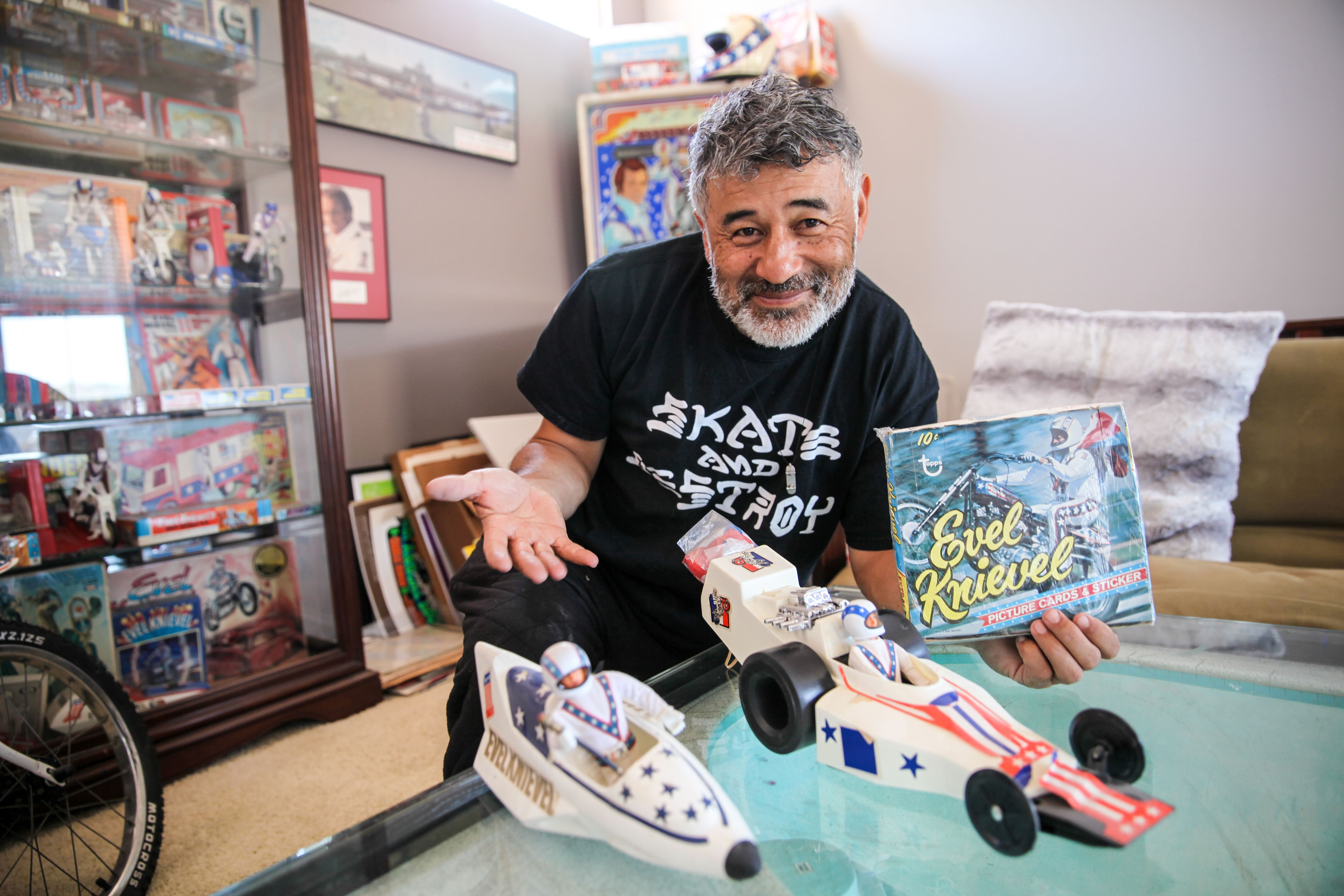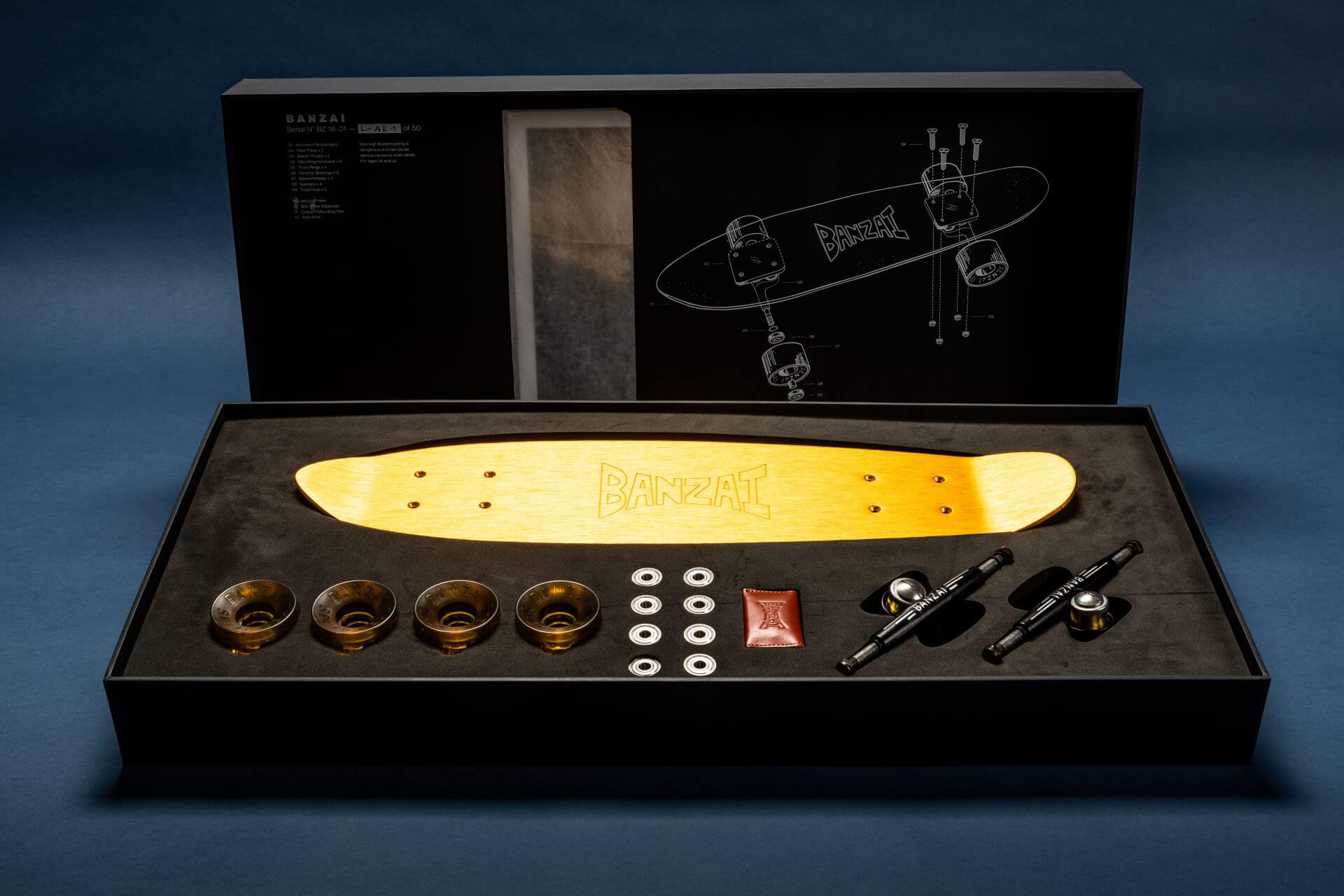Mark Gonzales is as fast as the wind, as quiet as the forest, as daring as fire, and immovable as the mountain. That’s how Japanese musician and designer Hiroshi Fujiwara describes Gonzales in the newly released monograph dedicated to the iconic pro skateboarder, and aptly titled Mark Gonzales. The book chronicles decades of skateboarding photography captured through the lens of Sem Rubio, as well as art, poetry and apparel designed by Gonzales — a homage to his career as the inventor of street skating and prolific innovator of art and streetwear design. Since the day my copy arrived, I can’t stop flipping through the pages, grinning like a Cheshire cat.
The colorful 208-page, hardcover volume is stunning, sleek and downright sexy. For anyone interested in skateboarding, art, poetry, streetwear and beautiful photography, this is a hearty score. The book is, in essence, a day in the life with the most influential skateboarder of all-time, sharing The Gonz’s imagery, poems, paintings and pop culture collaborations — Supreme, Adidas, Thrasher, Retrosuperfuture, JanSport and Études — superbly curated for the first time ever.
While Gonzales himself does not have an interview in the book, he is described by his contemporaries through numerous interviews including professional skateboarders Tony Hawk, Jason Lee, Ed Templeton, Jason Dill, as well as film artists, designers and musicians such as Spike Jonze, Tom Sachs, Fujiwara and American artist and designer Kaws.
“He’s definitely a real creative being. I think he uses every opportunity as an outlet, whether it’s what he chose to ear that day, or what he paints or how he skates, or the zines he makes. I think he’s very conscious of putting work and feelings out into the world,” Kaws says of Gonzales in his interview. “He changes a room when he walks into it. You know, he assesses a situation, and tries to redirect it in the way that he wants.”
On the afternoon that Gonzales and I were supposed to conduct our phone interview, the skate legend texted me asking if we could do our interview on FaceTime instead, which I was happy to oblige. Hanging out with Gonzales is, in a word, joyful. A conversation with a laughing Mark Gonzales exudes feelings comparable to sucking helium from a balloon and yelling at your best friend — exuberant, jovial, mischievous and off-the-cuff. He was at his New York City apartment and in good form, sipping coffee with a waggish smirk, his back to a view that overlooks Manhattan. Over the next hour, we perused the pages of his new book, discussed his favorite images, and found out what The Gonz has been working on lately.

Congratulations on this beautiful book. It will keep a nice place on our coffee table to share with friends and family. The poetry, photography, artwork, interviews — it all blends together so nicely.
That makes me happy to hear you say that. I’m really happy with it. I kind of stayed out of it as much as I could, my wife Tia was more involved than me. She used to work at Penguin Books and felt more comfortable working on it. My part was working with Sem to take all the photos, creating the art, and writing poems — that was most of the work that I did. Maybe I helped a little with picking art and photography that looks cool next to each other. I think sometimes when people are laying stuff out, they make an interesting connection between the artwork and what’s happening in the photos.
Most all the photography in the book was taken by Sem Rubio. How would you describe working with him?
It’s easy with today’s technology to not see what’s really happening in a moment, but Sem is always looking at light, architecture, the environment, the weather— he’s always aware of how things fit into the surroundings and then he captures it. If you’re not paying attention, he’ll capture you. He hangs in the background a lot. I’ll be doing something and not realize he’s there, and then he’s right there. His photos are amazing.

Many people interviewed for the book had really nice things to say about you — Spike Jonze, Kaws, Tony Hawk. Of note, Hiroshi Fujiwara compared your skateboarding to the wind, the trees, fire and mountains. I know you to be very humble. How do you process a compliment like that?
I wish I could be musically inclined — which I am not. Skateboarding is my language. It seems like music is Hiroshi’s language. To hear something like that from him, something so poetic —I’m blown away, it’s a nice compliment.
Are most of these contributors your friends?
I don’t know. For me, it’s so difficult to say who a friend is. I guess either nobody is my friend, or everyone is my friend. Why wouldn’t they be my friend? I want to be people’s friend.

Speaking of friends, was capturing the [above] photo of you and Tony Hawk as dangerous as it looks?
Not really, I’ve been skateboarding my whole life. It wasn’t dangerous. But I remember I wanted to put my board together faster because I knew Tony had limited time. And everything kept going wrong — the nuts from the board fell into the bowl, I didn’t have enough grip tape, so it was all patched up. That moment seemed like my life story, living it right in front of Tony Hawk — things falling into the bowl, not having enough grip tape [laughs]. But then it ended up working out and it was fun. I wish we had more time because then we could have been able to do more stuff.
I had recently skated with Tony at his ramp in Carlsbad and we did something like that before, where I go straight up and down, and he carves underneath me. But the half pipe is just flat and the bowl at Chelsea is round. And we had done the frontside air and we did it, so then I suggested we try the boneless. It’s amazing, you know, how people will take a push — Tony did a backside smith grind that day with just a simple push, it was so comfortable and locked in. I can’t do backside smith grinds, so my eyes were like popping out at how simple it was for him.

I have to ask — do you have a favorite photo in this book?
Let me see [thumbs through book]. This one is my wife’s favorite photo [Mark holds up the book to show pages 14-15 where he is skating in the mist]. This one is my favorite [shows the photo on page 8 where Mark is riding a bicycle in New York City]. I think that it captures me how I mostly am. I don’t have that bike anymore, but at least once a week, if you were around, you would see me going fast on that bike through the city. That’s on Canal Street — the street that comes off the bridge from Chinatown through SoHo and Tribeca. I think it’s my favorite photograph in the book because I’m making eye contact with Sem. I don’t think he has taken a lot of photos of me making eye contact. Typically, I’m skating and focused on what I’m doing.
I also like this photo because I had something I was working on in that bag. It’s crazy because the older I get, the more often I have something on me that I have to get done. Whereas before, I never had anything important on me that needed to be done. That’s not the case anymore.

I love this photograph taken of you doing a boneless at the courthouse.
And this one here I think is across from the courthouse [page 6-7], and I’m pushing with enthusiasm, but it’s weird because there is nothing to hit on that side. Oh, here it is. Oh wow, it’s not the same place and maybe not the same day. I feel like that Janis Joplin song, in one of her songs, she must be a little bit partied out, feeling the vibe, and she says, “It’s all the same effing day.” Meaning to me, that it could happen today, it could happen tomorrow, it’s all really the same day [laughs]. Janis was somebody who was super into psychedelics, but also somebody who said deep things that make a lot of sense and connected.
What are the origins of the signature ghost-like character seen in your art and design work?
I call it a shmoo. I was in France for a while, hanging out, when I was younger. There’s a Barbapapa character, by a Parisian couple in the 1970s. I must have gone somewhere and seen this somewhere, the creatures are very similar. I guess I must have been very inspired by that, because when I look at it, that must be where I got the idea from — it’s very European. Mine are fun to draw and they’re simple, you just draw the outline quick and add the expression. It just takes five seconds.
But now that I’m going to be 53 next June, I’m getting more serious with my art, adding shade and color. I still love doing the quick characters, I guess they just need shading now [laughs]. But it also depends on my mood. Sometimes I can capture what I want to say in a quick drawing and sometimes the quick doodle doesn’t capture the full range and spectrum, fading from one color to another, something more complex than just a black and white drawing. Other times I’ll be working on something very complex at the table and my son Enzo will come in with a pen and just draw right over it. And then I realize how to some people, to see the detail and complexity of art is so valued to view, and then a child could just color right over the work with their own pen, and sometimes that what it’s about.

There are so many facets to your talent — skateboarding, design, drawing, painting, poetry and more. How has your art evolved over the years and what bring you the most joy today?
I’ve been into using colored pencils and doing a lot of drawing with shadows and also blending colors, even if it’s just with spray paint or with the pencils. Those are the things I’ve been enjoying doing the most. Shading this way and putting shadows that way, where most of my life, I haven’t been concerned with those types of things. I was often just doodling with a sharpie, not concerned with the light or shadow. I guess I’ve been enjoying doing that more, trying to draw realistic or add shadow or color or fades — that kind of stuff.
But for me, if I had to say, the most enjoyment I get right now is from reading. It’s so weird but reading poetry or the children’s books is what has brought me the most joy lately. It’s not my stuff I’m reading but reading my son stories before bed. Reading poetry is what I’m about right now. I know them by heart now.
This article was featured in the InsideHook newsletter. Sign up now.




















